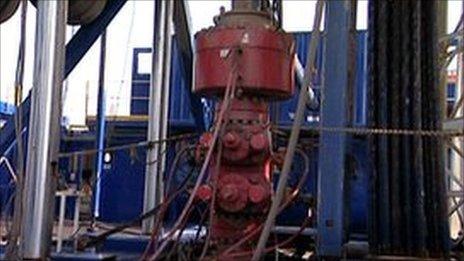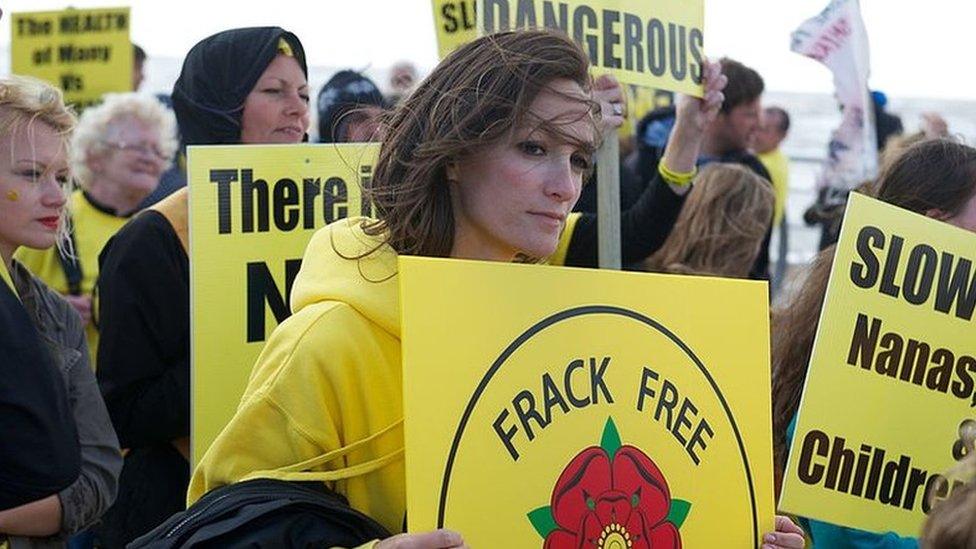Vale council defer fracking gas test drilling decision
- Published
Councillors in the Vale of Glamorgan have decided to postpone their decision on whether to allow or refuse gas drilling until a site visit next month.
Bridgend-based Coast Oil and Gas Limited has applied to explore for conventional and shale gas at Llandow industrial estate.
That planning application has now been deferred until the end of October
There is opposition to the application, and to other gas drilling sites in south east Wales.
A group called The Vale Says No has been formed.
Much of the concern is about an element of drilling for shale gas called fracking.
The technical term is hydraulic fracturing, and it's a process which has been condemned in several US states, where drilling deep underground has became popular in the past eight years.
In Europe, France has banned fracking after a 100,000 people signed a petition, but the Polish government is more supportive of using shale gas as an energy source.
Here in Wales, according to The Vale Says No campaign's website, gas drilling, especially shale gas drilling could be "potentially catastrophic ..."
Louise Evans, one of the lead campaigners, said: "At this stage, the main concern is the noise that will be caused by the seven weeks of 24-hour a day drilling in the peaceful rural area.
"It is hugely important that we all stand up and be counted and say no to this proposal. Drilling for gas in our beautiful countryside should not even be considered."
The group was outside the Barry offices of the Vale of Glamorgan council on Thursday, where the planning committee deferred a decision, pending a site visit in October.
Councillors will visit the site in order to see how the application to test drill would affect businesses trading off the industrial estate, and the houses nearby.
After the decision was deferred, Ms Evans said: "It means that we get more chance to raise awareness of this campaign because there's still very little knowledge in the local area."
Gerwyn Williams, owner of Coast Oil and Gas says the potential in terms of energy security and local jobs are considerable.
Mr Williams said: "At the moment we're not doing anything more than exploratory drilling.
"It's going to take us a couple of years to collect all the information we want.
"In that two years, maybe, that it takes us to get to a state where we're happy to spend a very, very large amount of money on drilling shale gas wells. There are no chemicals that we're allowed to use that can be harmful to the environment."
Mike Jones's Crosslands Kennels is on the site of the old airfield near Llandow. His family home, and the kennels are opposite the road from the Vale Business Park where the test drilling may take place subject to planning approval.
He said: "It's not just purely for scientific interest.
"They're looking because they believe it's there. If they find it they're not just going to go away and say: 'Yes, we've found it, yippee'. They're actually then going to want to extract it.
"That's our issue. To extract it there are safety issues, there are logistic issues, people live very close by, people work very close by."
The side effects of fracking are still being investigated after two earth tremors near Blackpool last summer.
For the time being, gas drilling in that part of Lancashire has been suspended. Concerns are on contaminating any underground water, and which chemicals are pumped at high pressure to release shale gas.
Energy security
But another report published earlier this month by the Institution of Gas Engineers and Managers, called "Shale Gas, a UK energy miracle?" suggests that "unconventional resources" such as shale gas, is regulated tightly enough in Britain by the Environment Agency and the Health and Safety Executive.
It agrees in its conclusion with the findings of the Government's Energy and Climate Change Select committee in Westminster.
But key questions in relation to fracking in Britain is how likely is it that there is a potentially vast gas resource which would improve Britain's energy security and reduce the need to import ever more expensive gas from abroad?
And more importantly in a densely populated state like Britain, and near one of the most densely populated areas of Wales, what are the possible environmental and health problems which could overshadow the benefits?
- Published26 September 2011

- Published31 July 2011

- Published1 July 2011

- Published1 June 2011
